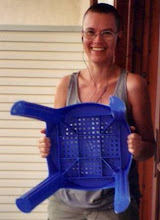Out on a Brighton dike
Today I'm sorting out my best clothes ready to venture into that other British gay coastal resort beginning with B. The one that isn't Blackpool. That would be Brighton, then. The number one (it has to be said) British gay coastal resort beginning with B.
This is the last chance for a summer holiday this year so I'm packing my long shorts and my short longs. I have both, lucky me. I also have long longs, just in case the sun is cloud-logged. The only item I don't possess are short shorts. A few years ago I used to play tennis in short shorts, but as I don't play tennis any more I can safely do away with anything so unflattering. Give me shorts on the baggy side with multiple pockets and I'm ready for adventure. Long shorts measure in at knee length or just above the knee. Short longs are three-quarter length trousers reaching to the calves. That's as precise as I'm willing to be.The Brighton-Nottingham link has turned up in other ways today. I love being able to form connections in memory and language. There's usually a book involved in this somewhere. The written word is a helpful prompt to memory, of course. There's even more joy when that book is on my shelves. My Woman-Stirred collaborator, Mary, has been talking to me about lesbian literary Paris in the first half of the twentieth century, including the lesbian gaze of American journalist, Janet Flanner. So of course I can't resist the wordplay leap from Flanner to flâneur, also strongly linked with Paris and a significant figure in the 1920s Paris salon culture represented by such writers as Djuna Barnes.
For writing on the lesbian flâneur, you can't do better than turn to Sally Munt. That would be Professor Sally Munt, author of Heroic Desire: Lesbian Identity and Cultural Space, amongst other things. This is the book I remembered to look out and which rests in my lap as I type. Our paths never crossed, but I get the feeling Sally didn't enjoy life as much in Nottingham, so it's good news for her that she found her way back to Brighton and the University of Sussex. In the move from Brighton to Nottingham in 1993 she wrote in her essay, "The Lesbian Flâneur", "in terms of my lesbian identity, I'm in another country [in Nottingham]".
Nottingham has been getting a lot of undeserved bad press recently, so I hardly dare add further fuel to the suggestion that there are many English cities preferable to Nottingham. For a holiday, especially if you like the sea, maybe. Let me just state now that I'm a very happy Nottingham resident and Nottingham has its own culture to be proud of. Still, Munt has some interesting observations worth quoting and (written over 10 ten years ago) these have absolutely nothing to do with the current furore over English city league tables.
Brighton looks to Europe for its model of Bohemia, for it is just warm enough to provide a pavement culture to sit out and watch the girls go by. ... Promenading on a Sunday afternoon on the pier, loitering in The Lanes, or taking a long coffee on the seafront, ostensibly reading The Observer, the gaze is gay. Brighton introduced me to the dyke stare, it gave me permission to stare. It made me feel I was worth staring at, and I learned to dress for the occasion. Brighton constructed my lesbian identity, one that was given to me by the glance of others, exchanged by the looks I gave them, passing - or not passing - in the street.
It's colder in Nottingham. There's nothing like being contained in its two large shopping malls on a Saturday morning to make one feel queer. Inside again, this pseudo-public space is sexualized as privately heterosexual. Displays of intimacy over the purchase of family-sized commodities are exchanges of gazes calculated to exclude. When the gaze turns, its intent is hostile: visual and verbal harassment make me avert my eyes. I don't loiter, ever, the surveillance is turned upon myself, as the panopticon imposes self-vigilance. One night last week, I asked two straight women to walk me from the cinema to my car. The humiliation comes in acknowledging that my butch drag is not leather enough to hide my fear.
Sally Munt, The Lesbian Flâneur in Heroic Desire: Lesbian Identity and Cultural Space (London: Cassell, 1998), pp.31-32.
It's really not that unsafe in Nottingham, I assure you. We just can't claim to be a gay city with a capital B. I guess this explains why I'm taking care over my wardrobe for Brighton. Not only is the weather (hopefully) warmer, I also have to be ready to acknowledge my position in the dyke stare. To be seen and known. To watch and recognise.
Hmmm, it seems my Brighton wardrobe is pretty much identical to my Nottingham wardrobe, with perhaps a little added emphasis on the shorts. Munt's point exactly, wouldn't you say? Going out on a dike is all about receiving appreciation for the effort. It's worth those hours at the ironing board when the population is stacked in your favour. It's not that the gaze in Nottingham is hostile; perhaps it just isn't always sure what it's looking at.
There's a further plus to getting away to a different city with an acknowledged gay scene - and that's the anonymity of the lesbian gaze. It's a small world - but if you're lucky - not that small. After all, the four hour drive from Nottingham to Brighton, this takes me to another country - right?
Labels: LGBTQ culture, travel




0 Comments:
Post a Comment
<< Home